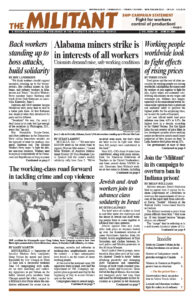Food prices and the cost of other necessities for working people are soaring worldwide, highlighting the urgent need for workers to join together to fight for jobs, higher wages and automatic cost-of-living adjustments on our wages and retirement pay. Millions face hunger, especially in the semicolonial world, because under capitalism food is produced and marketed solely to generate the highest profits for the employing class, not to meet the needs of humanity.
Last year official world food price inflation rose from 4.6% to 6.3%, the highest level in a decade, according to the United Nations. But that figure hides the real severity of price hikes in less developed countries where working people are forced to spend a much larger proportion of their income on food. In Latin America food prices are up 21%.
The governments of most of these countries face relentless pressure from the International Monetary Fund and the U.S. rulers to carry out “austerity” programs to bring down their national debt. That is, to assure the imperialist bankers and bosses get their loans paid back with interest.
In 2020 some 155 million people faced what the U.N. World Food Program euphemistically calls “food insecurity,” a rise of 20 million over the previous year.
These conditions are part of a broader crisis across the capitalist world. Bulk food prices for coffee, milk, sugar, oats, pork and orange juice on world futures markets have jumped by 32% since 2019. Major capitalist food processors say they’ll keep passing that rise onto workers who consume their products.
The scourge of soaring prices of basic necessities today comes on top of continuing widespread joblessness. The U.S. Department of Labor’s most recent report says 15,435,982 workers and their families are still trying to get by on some kind of unemployment “benefit.” The Democratic Party administration of Joseph Biden is moving to expand the money supply, hoping this largesse to the bosses will lead to some hiring.
“Sooner or later, some capitalist governments will panic and simply begin pumping out money in hopes of buffering the shocks,” Socialist Workers Party National Secretary Jack Barnes writes in New International no. 10. “When that happens, workers and working farmers get slammed with the worst of both worlds — high levels of unemployment and explosive inflation.”
Determined to change intolerable conditions resulting from rising prices, persistent unemployment and bosses’ growing disdain for safety, workers have gone out on strike today at ATI steel, Volvo Trucks and the Warrior Met coal mine, and are fighting boss lockouts at ExxonMobil and Marathon Petroleum refineries.
Working people have taken to the streets to protest lack of jobs and high prices in Oman, Yemen and Syrian Kurdistan in recent weeks. On May 17 demonstrators in several towns in Syrian Kurdistan forced the region’s government to halt a price hike it had imposed on the cost of fuel and cooking oil.
“We are dying of hunger [and] high prices,” Wafaa Al-Silwi told the Middle East Monitor during a demonstration in Taiz, Yemen’s third-largest city, June 3. Elsewhere in the Mideast, hundreds of men in several cities in Oman protested May 25, demanding the country’s ruler, Sultan Haitham, provide them with jobs.
Capitalist rulers offer no solution
Inflation hit a decadelong high in the U.S. through mid-May. Capitalist politicians argue over how to buffer the effects of this crisis. Some, like former Treasury Secretary Larry Summers, claim Biden’s recent government spending spree will make inflation worse. Biden and others in his administration denounce Summers, claiming their policies won’t hurt anybody and can eventually create some jobs.
Farmers and other small businessmen, who are forced to rack up heavy debts to try to survive, sometimes think inflationary “cheap money” policies can be of benefit. They hope currency devaluations will eventually diminish the value of their debts to nothing.
Neither proponents of increasing the supply of money, through government borrowing or just printing more dollars, nor those who press for a tighter money supply and higher interest rates, saying that’s what’s needed to prevent runaway inflation, offer workers and farmers a way to defend ourselves. “To protect ourselves from unemployment and ruinous price rises, workers and our unions must fight for a sliding scale of hours and wages,” said Maggie Trowe, Socialist Workers Party candidate for mayor of Louisville, Kentucky. “We need a shorter workweek with no cut in pay to spread the jobs around. And we’ve got to fight for cost-of-living adjustments in every union contract, so anytime prices go up, so do our wages, pensions and Social Security benefits.
“The SWP says workers should join with fellow consumers — farmers, small proprietors, housewives and others — to form committees to control prices,” Trowe said. “Together we can fight to make the bosses open their books to public inspection and demand control over setting prices. This will help make it clear that high prices aren’t caused by wage gains, but by capitalist profits and the anarchy of capitalist production.”
The current crisis hits women workers disproportionately. At least 7.3 million workers, primarily women, couldn’t get work May 12-24, because they were caring for children who can’t get to school or day care.
One sign of the impact on workers of the still modest uptick in hiring is the rate at which workers quit their jobs. It rose to a 20-year high in March. The boss press worries this is a sign of increasing confidence workers have in our ability to find another job with higher pay, and corresponding willingness to fight for better conditions.
“Coming together in working-class struggle is the road forward to build a powerful movement of workers, farmers and all those exploited and oppressed by capital to form our own political party, a labor party, take political power and establish a workers and farmers government,” said Trowe. “That is the strongest tool possible for us to make decisive inroads against capitalist property relations and end the twin scourge of unemployment and inflation once and for all.”


